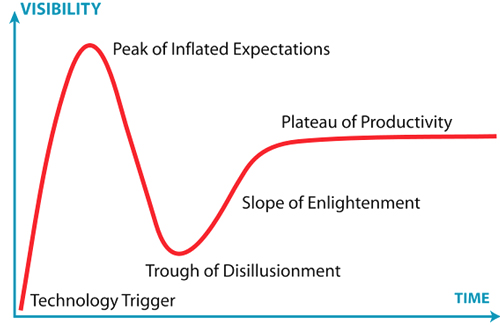“Every academic librarian worth her salt is embedded.”
“3D printers are so hot right now.”
“Are you telling me you don’t have QR code scavenger hunts at your library?”
“Your library doesn’t tweet?”
“But surely you have a Pinterest site!”
Although I’ve been in the profession only a decade, I’ve seen plenty of hyped-up ideas cycle through over the years. In 2006, every library had to have a blog. By 2008, every library had to have a Facebook page and a gaming program or collection. Right now, makerspaces are all the rage. And by 2014 it’ll be something else. These things aren’t necessarily bad. In many cases, they’re quite good and useful, and they point libraries in positive directions. However, hype can also blind librarians to what is a right fit for their institutions.
Fit over frenzy
 I’ve seen some libraries jump on hot new things quickly, and for some, that’s just fine. But others, as the fervor dies down, end up jumping ship for the next new thing. Those of us whose libraries are not on the cutting edge are fortunate to be able to observe these early adopters because we can learn from their successes and failures. However, I wonder what patrons think of their library’s constant adoption and abandonment of new services and technologies. On the other hand, I see some librarians, made cynical by the hype cycle, who dismiss out of hand anything they perceive as being overpromoted.
I’ve seen some libraries jump on hot new things quickly, and for some, that’s just fine. But others, as the fervor dies down, end up jumping ship for the next new thing. Those of us whose libraries are not on the cutting edge are fortunate to be able to observe these early adopters because we can learn from their successes and failures. However, I wonder what patrons think of their library’s constant adoption and abandonment of new services and technologies. On the other hand, I see some librarians, made cynical by the hype cycle, who dismiss out of hand anything they perceive as being overpromoted.
It’s easy to get blinded by the hype and either adopt something that isn’t a right fit for your library or not adopt something that is. One recent and rather visible cautionary tale is blogging. If you search the web, you’ll find a vast graveyard of library blogs started between 2004 and 2006, when librarians were being told that blogging was the best way to have human and transparent conversations with their patrons. Many libraries have developed successful blogs because they were a good fit for their community and understood what it took to make a blog successful. Many more, however, abandoned their blogs due to lack of staff time or patron interest.
Librarians need to evaluate trends through a critical lens and examine the environment in which we operate. Who are our patrons? What are their needs? What are the priorities of our community and library board, or provost and president? Our priorities should flow from those needs and priorities.
My university is focused right now on pedagogical innovation and growing our online offerings. Clearly, the library should be poised to support and provide leadership in these areas. When I see a shiny new thing, I ask myself, “How will this further the library’s goals?” If I struggle to find an answer, I know it’s not worth pursuing.
Even when you’re not adopting the next new thing, there is frequently something to be learned from it. Three-dimensional printers may not be a good fit for your library, but they point to the value of providing technologies that support content creation. For your library, that may mean providing video-editing or web-design software. Maybe you don’t have the time to be embedded in online classes, but you can find a low-touch, high-impact way to embed library collections, services, and instruction in online classes.
The hype cycle will continue to churn and we’ll continue to be bombarded with technologies and approaches we’re told we just have to adopt to remain relevant or be good librarians. Focusing on the needs and priorities of those we serve helps to ensure that we are embracing—or not embracing—new tools for the right reasons.
MEREDITH FARKAS is head of instructional services at Portland (Oreg.) State University. She blogs at Information Wants to Be Free and created Library Success: A Best Practices Wiki. Contact her at librarysuccess[at]gmail.com.


